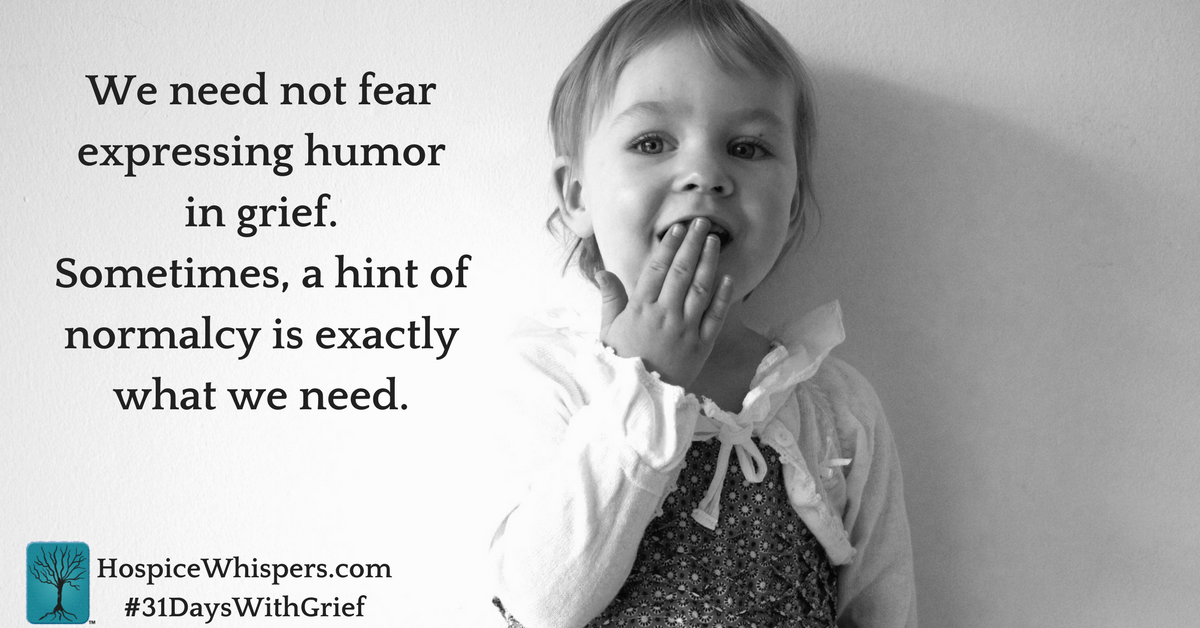31 Days of Walking with Grief: Others’ and Our Own
Day 28—Is there Space for Gallows Humor?
This is a month-long series to support persons grieving and those who love them. It includes content from “Sharing Our Stories: A Hospice Whispers Grief Support Workbook” available through Amazon and wherever books are sold.
In the midst of our discomfort with death, we may deflect away strong feelings of grief through the use of humor. This can be a challenge for us if it leads us to avoid either our feelings or those of another.
Other times, however, humor can be a very effective tool for coping as it provides some distance from the pain and reminds us that more still exists to live for beyond our grief. It can be hard for some to feel free to engage in or express humor, fearing doing so in a way that is offensive or hurtful to others.
We’re wise to be mindful, yet it is also important to not rob ourselves of the fullness of life, even as we life in the face of death and other loss.
I’ve shared elsewhere, through Hospice Times, an excerpt from Hospice Whispers: Stories of Life that speaks to this through a story called, “I’m Trying to Die Here”. After reading this story, you may explore the related reflection questions that are published in Sharing Our Stories: A Hospice Whispers Grief Support Workbook, and which I have also shared here for you, below:
I’m Trying to Die Here
Reflection Questions from Sharing Our Stories: A Hospice Whispers Grief Support Workbook
1) Where did you or your loved ones find humor in the midst of your sadness or grief? What was that like for you? For them? Is it helpful or disturbing for you?
2) When and why might humor not feel good to someone who is hurting?
3) What is your reaction to my shock at the dark humor of the therapy team I worked with in my younger years, as described in the beginning of the story?
4) Where do you believe the line is between irreverence and humor? Does that line change for you at times?
5) I mentioned in this story that most often we healthcare staff get to answer the same questions multiple times. When we experience grief, our thoughts and feelings can be quite disorganized as much of our inner physical and emotional resources are going toward coping with the stress.
What types of forgetfulness or fuzzy-headedness did/do you experience? How do you find gentleness for yourself during these times?
6) What differences are/were there between the ways you and other family members grieved and dealt with the stress of facing the death of a loved one? How do/did you navigate those different ways of grieving and handling stress?
ACTION PLAN:
Memories or thoughts arising from this story to hold onto…
Memories or thoughts arising from this story to let go of…
What action steps might I take to encourage my journeys of grief further along?
What might I need to take time to simply sit with?
What lessons or insights did I gain through remembering my own, or hearing of others’ journeys?
——————————-
My hope is that this excerpt and the entire series will lend a little insight to let you know that you are not crazy, you are not alone, and that you will find your way, perhaps even with the tool of humor at your disposal.
I’m glad you’re with me on the journey.
Peace,
Carla
 Rev. Carla Cheatham, MA, MDiv, PhD, TRT has served hospices as a chaplain and bereavement coordinator. She’s the Section Leader for the Spiritual Caregivers Section of the National Hospice and Palliative Care Organization and an adjunct professor at the Seminary of the Southwest. Through her Carla Cheatham Consulting Group, Carla provides training and consulting for professional caregivers nationwide. She is the author of Hospice Whispers: Stories of Life and its companion volume, Sharing Our Stories: A Hospice Whispers Grief Support Workbook. Her next book, On Showing Up with Suffering: Others’ and Our Own, is set to publish in 2017.
Rev. Carla Cheatham, MA, MDiv, PhD, TRT has served hospices as a chaplain and bereavement coordinator. She’s the Section Leader for the Spiritual Caregivers Section of the National Hospice and Palliative Care Organization and an adjunct professor at the Seminary of the Southwest. Through her Carla Cheatham Consulting Group, Carla provides training and consulting for professional caregivers nationwide. She is the author of Hospice Whispers: Stories of Life and its companion volume, Sharing Our Stories: A Hospice Whispers Grief Support Workbook. Her next book, On Showing Up with Suffering: Others’ and Our Own, is set to publish in 2017.



Leave a Reply